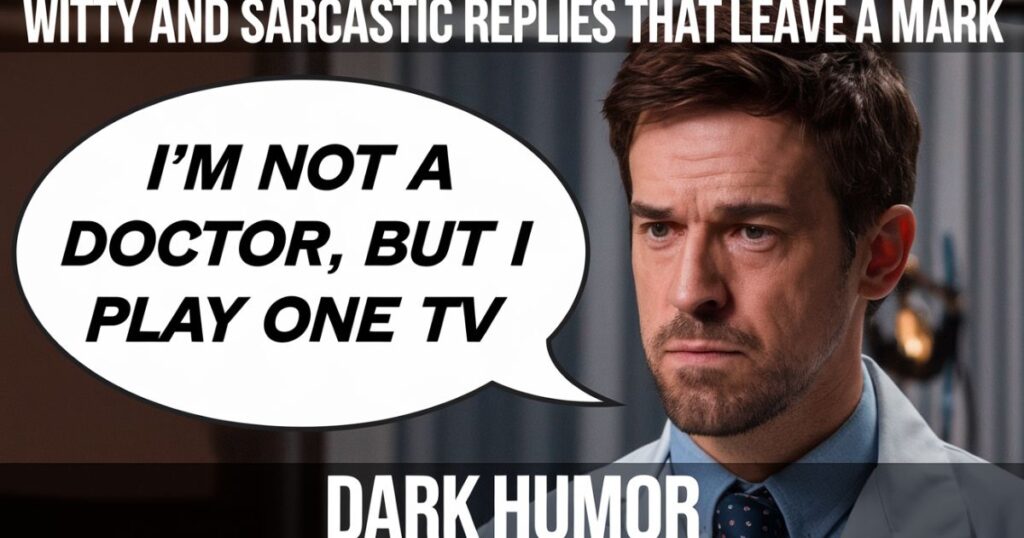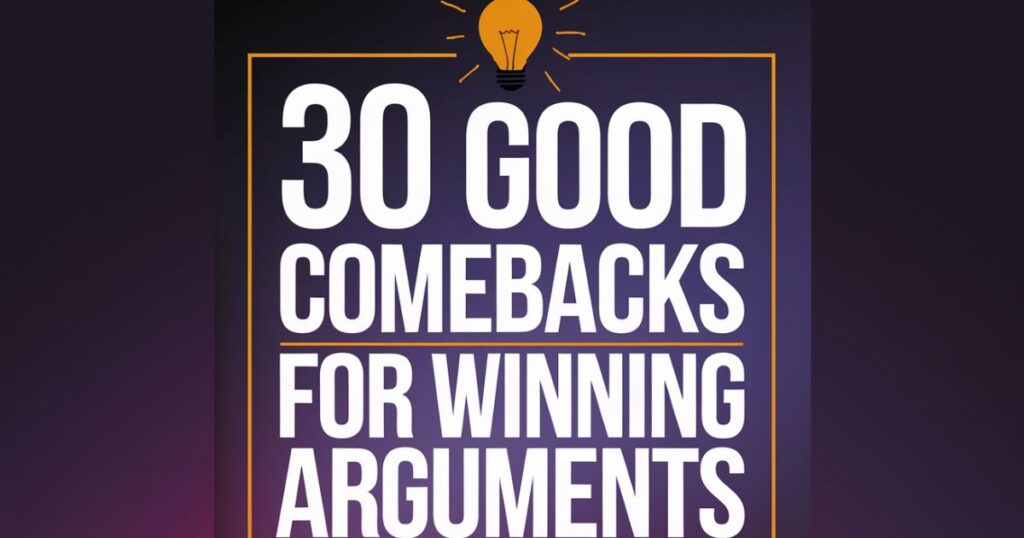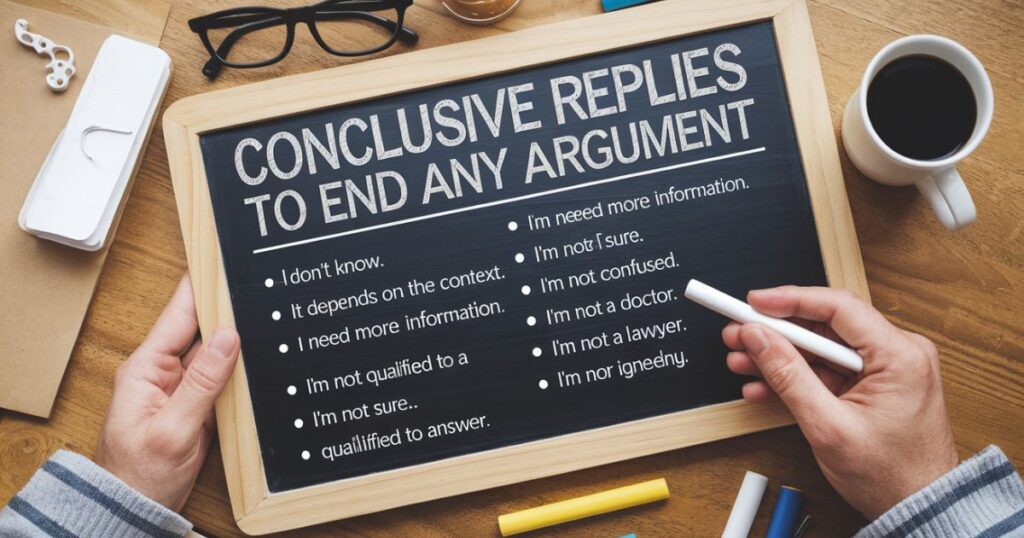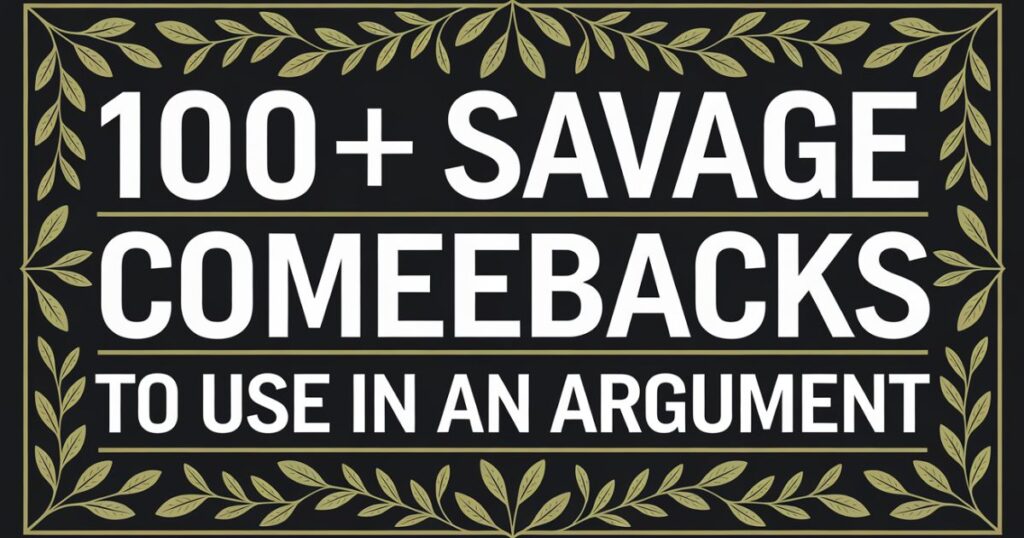Everyone has faced a tough argument at some point. Sometimes, it feels like the other person has all the good comebacks. Having a few sharp responses ready can help you stand your ground. These comebacks can add some spice to your conversation and show that you’re not afraid to speak your mind.
In this guide, you’ll find over 100 savage comebacks to use in various situations. Whether you’re dealing with a rude friend or a challenging opponent, these comebacks will help you respond with confidence. With the right words, you can turn the tables and keep the conversation interesting. Let’s dive into some witty and clever responses that will leave an impact!
100+ Savage Comebacks To Use in an Argument | Clever Replies
Savage comebacks are sharp, witty replies that can turn an argument in your favor. They often catch the other person off guard. Using these comebacks can make a conversation more entertaining. However, it’s important to use them wisely. The goal is to make your point without being hurtful.
These clever replies can help you assert yourself in discussions. They can defuse tension and show confidence. It’s not just about winning; it’s also about delivering a clever retort. Remember, the best comebacks are clever and concise. Keep them light-hearted to avoid escalating conflicts further.
Read Also:15 (Quick-Witted) Comebacks for Short People[2024]
One-liners for Instant Wins

One liners are short, clever statements. They pack a punch in just a few words. These quick phrases can make people laugh or think.
Using one liners is a great way to lighten the mood. They can also break the ice in awkward situations. A well timed one-liner can win over an audience instantly.
- “I’m on a seafood diet. I see food, and I eat it!”
- “I told my computer I needed a break, and now it won’t stop sending me beach wallpapers.”
- “I would agree with you, but then we’d both be wrong.”
- “I’m not arguing; I’m just explaining why I’m right.”
- “Why don’t scientists trust atoms? Because they make up everything!”
- “I’m not lazy; I’m on energy saving mode.”
- “I used to be indecisive, but now I’m not so sure.”
- “I’m not a complete idiot; some parts are missing.”
- “I didn’t fall; I’m just spending some quality time with the floor.”
- “I have a new philosophy. I’m only going to dread one day at a time.”
- “Of course I talk to myself; sometimes I need expert advice.”
- “I’m multitasking: I can listen, ignore, and forget all at once.”
- “If I had a dollar for every time I got distracted, I wish I had a puppy.”
- “I’m on a whiskey diet. I’ve lost three days already!”
- “Life is short. Smile while you still have teeth.”
- “The early bird might get the worm, but the second mouse gets the cheese.”
- “I told my therapist about my procrastination. We’ll talk about it next week.”
- “I’m not great at advice. Can I interest you in a sarcastic comment?”
- “I don’t need anger management; I need people to stop pissing me off.”
- “I’d explain it to you, but I left my English in the Dingbat dictionary at home.”
- “I’m not a hoarder; I’m a collector of things I probably don’t need.”
- “I’m not short; I’m just concentrating on being awesome!”
- “I’m reading a book on anti gravity. It’s impossible to put down!”
- “If I had a penny for every time I said something smart, I’d be broke.”
- “I can’t believe I got fired from the calendar factory. All I did was take a day off.”
- “The best part about being my age? I don’t care what anyone thinks!”
- “I finally figured out the only time I feel truly alive: when I’m napping!”
- “I can resist anything except temptation.”
- “I’m not really a control freak, but can I show you the right way to do that?”
- “I’m not weird; I’m just a limited edition.”
- “I would make a joke about pizza, but it’s just too cheesy.”
- “I don’t need a hair stylist; my pillow gives me a new hairstyle every morning.”
- “If you think I’m crazy, you should see my other personalities!”
- “I’m on a diet. I can only have food that starts with ‘ch’like chocolate!”
- “I put the ‘pro’ in procrastination.”
- “I told my wife she was drawing her eyebrows too high. She looked surprised.”
- “I’m not a morning person; I’m a coffee person.”
- “My wallet is like an onion; opening it makes me cry.”
- “I finally found my phone! It was on silent mode. Isn’t that the best?”
- “You can’t make everybody happy. You’re not a taco!”
- “I’m a huge fan of whiteboards. They’re re-markable!”
Intellectual Burns That Outsmart
Intellectual burns are clever and sharp remarks. They show wit and intelligence. These burns can make your point while putting someone in their place.
Using intellectual burns can be powerful. They often surprise the other person. A well-timed comment can leave them speechless.
- “I’d explain it to you, but I left my English in the Dingbat dictionary at home.”
- “I’m not saying you’re stupid; I’m just saying you have bad luck when it comes to thinking.”
- “I’d agree with you, but then we’d both be wrong.”
- “I’m trying to see things from your perspective, but I can’t get my head that far up my own backside.”
- “You bring everyone so much joy when you leave the room.”
- “You have the right to remain silent because whatever you say will probably be stupid anyway.”
- “You’re proof that even evolution makes mistakes.”
- “I’m not arguing; I’m just explaining why I’m right.”
- “If ignorance is bliss, you must be the happiest person on the planet.”
- “I would call you a tool, but that implies you’re actually useful.”
- “I’m not a proctologist, but I can see you’re full of it.”
- “I’d like to see things from your perspective, but I can’t get my head that far up my own.”
- “It’s a shame you can’t Photoshop your personality.”
- “Your secrets are always safe with me. I never even listen when you tell me.”
- “I’d offer you a nasty look, but you’ve already got one.”
- “You’re like a cloud. When you disappear, it’s a beautiful day.”
- “I’m not saying you’re slow, but it takes you an hour to watch 60 Minutes.”
- “I’m not saying you’re dumb, but you’d struggle to pour water out of a boot with instructions on the heel.”
- “I’d explain it to you, but I don’t have any crayons.”
- “You have the unique ability to make everything worse just by opening your mouth.”
- “You must have been born on a highway, because that’s where most accidents happen.”
- “Your mind is like a web browser with too many tabs open and no clue where you are.”
- “I’m not saying you’re useless, but you make a great doorstop.”
- “If I wanted to hear from an idiot, I’d watch reality TV.”
- “You’re like a software update whenever I see you, I think, ‘Not now.'”
- “I’m not saying you’re annoying, but you’re like a fly that keeps buzzing around.”
- “You’re living proof that even a broken clock is right twice a day.”
- “I’d call you an idiot, but that would be an insult to all stupid people.”
- “You have an entire life to be an idiot. Why not take today off?”
- “You’re a gray matter wasteland.”
- “If you were any more inbred, you’d be a sandwich.”
- “I’m not saying you’re loud, but you could wake up a dead horse.”
- “You’re about as useful as a screen door on a submarine.”
- “I’d explain it, but I don’t have the time or the crayons.”
- “You’re as sharp as a marble.”
- “If I wanted to hear from a fool, I’d just talk to myself.”
- “You’re not stupid; you just have bad luck when it comes to thinking.”
- “You’re the reason God created the middle finger.”
- “You’re like a software bug, irritating and hard to get rid of.”
- “You have the charisma of a wet rag.”
- “If brains were dynamite, you wouldn’t have enough to blow your nose.”
- “You’re the reason even the sun has to set.”
- “I’d call you a joke, but I don’t want to offend the comedians.”
Witty and Sarcastic Replies That Leave a Mark

Witty replies can change the mood of a conversation. They are clever and often funny. A good witty comeback makes people think and laugh at the same time.
These replies show your intelligence and humor. They can make you stand out in any discussion. A well timed witty remark can leave a lasting impression.
- “Oh, I’m sorry. I didn’t realize you were an expert on my life.”
- “I’d agree with you, but then we’d both be wrong.”
- “If I had a dollar for every smart thing you say, I’d be broke.”
- “I’m not arguing; I’m just explaining why I’m right.”
- “It’s not that I’m smart; it’s just that you’re dumb.”
- “I could eat a bowl of alphabet soup and poop out a smarter statement.”
- “I’d explain it to you, but I left my English in the Dingbat dictionary at home.”
- “I don’t have the energy to pretend I like you today.”
- “I see you brought your ‘A’ game. Too bad it’s a D.”
- “You bring everyone so much joy when you leave the room.”
- “I’d call you a tool, but that implies you’re useful.”
- “I’m not insulting you; I’m describing you.”
- “I’m not sure what your problem is, but I’m sure it’s hard to pronounce.”
- “I’d offer you a nasty look, but you already have one.”
- “If laughter is the best medicine, your face must be curing the world.”
- “I don’t have the time or the crayons to explain this to you.”
- “Somewhere out there, a village is missing its idiot.”
- “I’m not saying you’re bad at math, but you might want to double-check your count.”
- “I’m all for helping others, but I don’t think you’re going to make it.”
- “You’re like a software update; whenever I see you, I think, ‘Not now.'”
- “If you were any more dense, light would bend around you.”
- “You sounds like a reasonable time to up my medication!”
- “I would ask how old you are, but I know you can’t count that high.”
- “You’re proof that even evolution makes mistakes.”
- “I’m not sure what you’re trying to accomplish, but keep it up!”
- “Is your brain on vacation? Because it’s not working right now.”
- “You must have been born on a highway, because that’s where most accidents happen.”
- “I’m not a photographer, but I can picture you being quiet.”
- “If ignorance is bliss, you must be the happiest person on Earth.”
- “You’re like a cloud. When you disappear, it’s a beautiful day.”
- “If you were any more basic, you’d be a default setting.”
- “You really bring a lot to the table like a napkin.”
- “I’d call you a tool, but that implies you’re useful.”
- “You have the right to remain silent because whatever you say will probably be stupid.”
- “You’re like a software update; whenever I see you, I think, ‘Not now.'”
- “If I had a dollar for every time you said something smart, I’d be broke.”
30 Good Comebacks for Winning Arguments

Good comebacks are smart replies in a conversation. They can help you stand your ground in an argument. A well timed comeback shows confidence and wit.
Using good comebacks can change the direction of a discussion. They make your point clear without being rude. A clever response can also lighten the mood.
- “I’m not arguing; I’m just explaining why I’m right.”
- “I’d agree with you, but then we’d both be wrong.”
- “That’s a nice opinion. I’d love to hear it when I’m interested.”
- “You’re entitled to your own opinion, but not your own facts.”
- “I’m not ignoring you; I’m just prioritizing my sanity.”
- “Did you take a class on being wrong? You’re acing it!”
- “I see your point, but I’d rather not.”
- “You have the right to remain silent because whatever you say will probably be wrong.”
- “I’m not trying to be rude; I’m just being honest.”
- “I’m sorry, but I can’t hear you over the sound of how awesome I am.”
- “You bring so much joy when you leave the room.”
- “I can explain it to you, but I can’t understand it for you.”
- “Thank you for sharing your opinion. I’ll add it to my list of things I don’t care about.”
- “You sound like a pro at misunderstanding things.”
- “I’d call you a tool, but that implies you’re actually useful.”
- “Some days I amaze myself. Other days, I put the car keys in the fridge.”
- “I’m not lazy; I’m just on energy-saving mode.”
- “I can’t help but notice how much you enjoy being wrong.”
- “You should really try to keep your opinions to yourself; it’s much less embarrassing.”
- “I’m not trying to be difficult; it just comes naturally.”
- “I’d love to stay and chat, but I’d rather have a root canal.”
- “I’d explain it to you, but you’d still not get it.”
- “You’re like a software update; whenever I see you, I think, ‘Not now.'”
- “It’s cute how you think your opinion matters.”
- “I’m not arguing; I’m just passionate about being right.”
- “If ignorance is bliss, you must be the happiest person alive.”
- “Why don’t you go and find a nice corner to sit in?”
- “I’m not saying I’m Batman, but no one has ever seen me and Batman in the same room.”
- “I can see you’re really trying, but I still don’t care.”
- “I’m here to have a conversation, not to convince you.”
- “That’s your opinion. It’s still wrong, but it’s your opinion.”
- “I’m not judging you. I’m just telling you that you’re wrong.”
- “You do realize that you’re talking to someone who doesn’t care, right?”
Conclusive Replies to End Any Argument

Conclusive replies are strong statements that end arguments. They provide clear reasoning and can shut down further debate. Using them shows confidence and understanding of the topic.
These replies are often based on facts or logical reasoning. They help clarify your point without being rude. A well-placed conclusive reply can bring discussions to a close.
- “That’s your opinion, but here are the facts.”
- “I see your point, but I stand by my perspective.”
- “Let’s agree to disagree on this.”
- “The evidence supports my argument.”
- “We’ve discussed this enough; let’s move on.”
- “I appreciate your input, but I’ve made my decision.”
- “At the end of the day, this is what matters most.”
- “Let’s focus on solutions rather than problems.”
- “Your viewpoint is valid, but it doesn’t change my stance.”
- “This discussion is going in circles; I think we should stop here.”
- “I respect your opinion, but I have to follow my beliefs.”
- “Ultimately, it’s my choice, and I stand by it.”
- “Thank you for sharing, but my mind is made up.”
- “We both have strong feelings; let’s leave it at that.”
- “I understand your concerns, but this is the best path forward.”
- “I believe we’ve exhausted this topic; can we move on?”
- “It’s clear we see things differently; let’s agree to part ways.”
- “Your argument has merit, but I still disagree.”
- “Let’s not drag this out any longer.”
- “I hear you, but this is my final answer.”
- “I appreciate the discussion, but I’m done debating this.”
- “I’ve made my point; I won’t argue further.”
- “This is a matter of personal choice, and I choose differently.”
- “I value our conversation, but we need to respect each other’s views.”
- “This topic is closed for further discussion.”
- “Thanks for your input, but I’m sticking to my position.”
- “I think we both need a break from this topic.”
- “We can revisit this later if needed, but not now.”
- “Let’s prioritize our relationship over this disagreement.”
- “I have considered your arguments, but I remain unconvinced.”
- “We both deserve to have our opinions heard, but we should move on.”
- “I appreciate your passion, but I’ve made my decision.”
- “Let’s focus on what we can agree on instead.”
- “At this point, I think we’re just repeating ourselves.”
- “I acknowledge your viewpoint, but I am firm in mine.”
- “This conversation is no longer productive; let’s change the subject.”
- “I think we’ve said all that needs to be said.”
- “Thank you for the discussion, but I’m choosing my path.”
- “It’s clear we’ll never see eye to eye on this.”
- “I’ll reflect on your words, but I’m not changing my mind.”
- “Let’s not waste any more time on this.”
- “I’m ready to move on; are you?”
Best Practices to Handle Arguments

Staying calm is key during an argument. Take deep breaths to manage your emotions. Avoid raising your voice, as it can escalate the situation. Speak slowly and clearly to express your thoughts. Staying collected helps you think better and respond wisely.
1. Observe Reactions
Observing reactions is important in conversations. It helps you understand how others feel. Pay attention to their body language and facial expressions. These signals can tell you if someone is upset or confused. Noticing these cues can guide your response.
2. Maintain Composure

Maintaining composure is essential during conflicts. It helps you think clearly and make better decisions. When you stay composed, you avoid saying things you might regret later. Keeping your emotions in check allows for a more productive conversation. It also sets a positive example for others involved.
3. Provide Context
Context is important for understanding. It gives background information about a situation. Without context, things can be confusing. For example, if someone says, “It is cold,” you might wonder what they mean. Are they talking about the weather? Or maybe they are feeling cold inside? Context helps clarify their meaning.
4. Show Empathy

Empathy means understanding how someone else feels. It is about putting yourself in their shoes. When you show empathy, you listen to others with care. You try to understand their thoughts and emotions. This helps build strong relationships. It makes people feel valued and heard.
5. De-escalate When Needed
Sometimes, tensions can rise in conversations or situations. It is important to recognize when this happens. People may start to feel angry or frustrated. When you notice this, it’s a good time to de escalate. This means reducing the intensity of the situation. You can do this by staying calm and listening to the other person. A simple gesture, like nodding or using a soft tone, can help.
6. Reflect and Adjust

Reflection is a powerful tool for personal growth. It allows us to pause and think about our experiences. By looking back, we can understand what worked well and what did not. This understanding helps us learn from our mistakes. Reflection also encourages us to celebrate our successes. When we recognize our achievements, we boost our confidence and motivation.
Final Thoughts
In conclusion, having a repertoire of savage comebacks can empower you in arguments and witty exchanges. These clever responses not only showcase your confidence but also keep conversations engaging.
While it’s essential to use them wisely, a well-timed comeback can diffuse tension or assert your point. Remember, the goal isn’t just to win an argument but to communicate effectively. With these comebacks at your disposal, you’ll navigate disputes with humor and sharpness, leaving a lasting impression on your audience.
FAQ’s
What is a great comeback?
A great comeback is a clever and witty response that effectively counters an argument or insult. It highlights your confidence while maintaining a sense of humor or sharpness.
How do I shut someone down in an argument?
To shut someone down in an argument, stay calm and confident while clearly stating your points. Use logical reasoning and evidence to support your claims, and avoid personal attacks to maintain credibility.
How to reply shut up?
You can reply with humor by saying, “I can’t hear you over the sound of how awesome I am!” Alternatively, simply respond with, “Okay, but only if you promise to listen later.”






